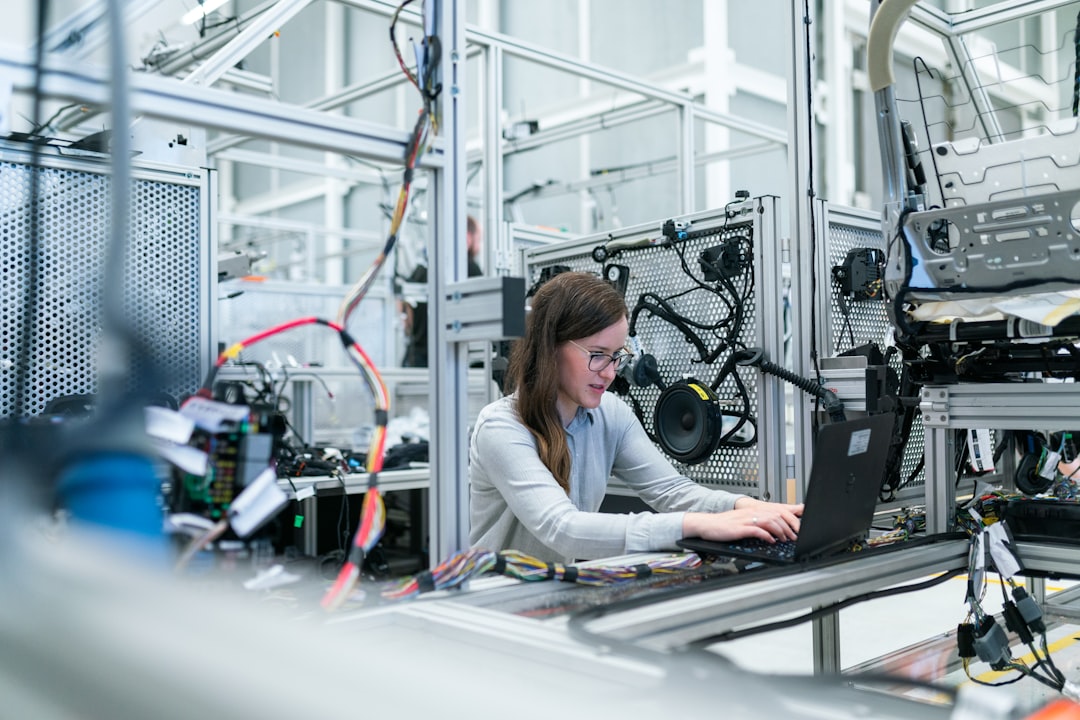Unlock encrypted content
Please enter your SSCE key to initiate on-the-fly decryption.
Decryption key: (Click cancel if you don't have the key)
Copied link to clipboard.
This feature is unavailable for free accounts. Upgrade now and enjoy all Premium benefits.
Go Premium!
This feature is unavailable for free accounts. Upgrade now and enjoy all Premium benefits.
Go Premium!
Please open this page in browser ( Google Chrome or Safari ) to use this feature.
Open In Browser
Exploring Advanced Data Storage Solutions and Their Impact on Modern Human-Machine Interaction.
Random related video for this blog.
Copied share link to clipboard.
In today's rapidly evolving technological landscape, the importance of efficient data storage solutions cannot be overstated. With the proliferation of remote work, autonomous vehicles, and the increasing reliance on mobile applications, organizations and individuals alike are seeking innovative methods to store, access, and secure their data. This article delves into the multifaceted world of biometric data storage, human-machine interfaces, and file collaboration, emphasizing the importance of remote access and data security in our interconnected lives.
Biometric Data Storage and Security
Biometric data storage refers to the collection and management of data derived from unique biological traits, such as fingerprints, facial recognition, and iris patterns. This technology has gained significant traction in various sectors, including finance, healthcare, and security, due to its ability to enhance data security and streamline user authentication processes. For instance, biometric authentication can mitigate the risks associated with traditional password-based systems, which are often vulnerable to breaches. The integration of biometric data storage into human-machine interfaces (HMIs) has revolutionized user experiences across numerous devices. In automotive applications, for example, biometric systems can personalize driver settings—such as seat position, climate control, and infotainment preferences—based on the recognized driver's biometrics. This not only enhances convenience but also contributes to safer driving experiences by allowing vehicles to adapt to the driver's needs in real-time. However, with the benefits of biometric data storage come significant concerns regarding data security and privacy. The storage of sensitive biometric information necessitates robust security measures to protect against unauthorized access and potential misuse. Organizations must implement advanced encryption techniques and secure data transfer protocols to safeguard this information. FileLu, for instance, offers Secure-Solo-Cipher Encryption (SSCE), which adds an additional layer of protection against data breaches. By prioritizing data integrity and privacy, companies can foster trust among users while leveraging the advantages of biometric technologies.Human-Machine
Interface Innovations The evolution of human-machine interfaces has fundamentally transformed how we interact with technology. Modern HMIs leverage a variety of input methods, ranging from touchscreens to voice recognition, allowing for more intuitive and efficient user experiences. For instance, in manufacturing environments, advanced HMIs enable operators to control machinery via simple gestures or voice commands, significantly improving productivity and reducing the likelihood of human error. In the realm of autonomous vehicles, HMIs play a crucial role in facilitating seamless communication between the driver and the vehicle. These systems can provide real-time feedback on vehicle performance, navigation, and safety alerts, empowering drivers to make informed decisions. Furthermore, as autonomous technology continues to advance, the integration of HMIs with biometric data will likely enhance the safety and personalization of these vehicles, creating a more engaging driving experience. File collaboration is another critical aspect of modern HMIs, particularly in remote work scenarios. With the rise of distributed teams, the need for efficient file sharing and collaboration tools has never been greater. Solutions that allow for web uploads, URL remote uploads, and FTP/FTPS capabilities empower users to access and share files seamlessly, regardless of their physical location. For example, FileLu's mobile app enables users to upload files directly from their devices, facilitating quick and easy collaboration on projects.
Data Security in Remote Access and Collaboration
As organizations increasingly rely on remote access for their operations, the security of data during transmission and storage becomes paramount. Cybersecurity threats are ever-evolving, making it essential for businesses to adopt comprehensive strategies to protect their sensitive information. This includes utilizing secure file transfer protocols, employing encryption methods, and implementing stringent access controls. FileLu stands out as a robust solution for secure file storage and backup, offering features like SSL protection for data transfers and the option for users to enable SSCE. This level of security is crucial for businesses that handle sensitive client information, ensuring that data remains confidential and protected from potential breaches. Moreover, the ability to perform file searches and collaborate efficiently enhances productivity while maintaining data security. With tools that support file collaboration and search functionalities, users can easily locate and share necessary documents, streamlining workflows and reducing the time spent on administrative tasks. The integration of mobile apps into these systems further enhances accessibility, allowing users to manage their files on the go. As more industries embrace remote work and cloud-based solutions, the demand for secure and efficient data storage options will continue to rise. Companies that prioritize data security while providing user-friendly interfaces will be better equipped to navigate this evolving landscape.Cloud File Backup and Mobile Accessibility
In the context of data storage, cloud file backup has emerged as a vital solution for individuals and organizations alike. The convenience of accessing files from any device with an internet connection has transformed how we manage our data. Cloud storage solutions, like FileLu, offer users the ability to back up their files securely, ensuring that critical information is protected against data loss due to hardware failure or other unforeseen circumstances. Mobile accessibility is another significant advantage of cloud-based storage solutions. With dedicated mobile apps, users can upload, share, and access their files anytime, anywhere. This flexibility is particularly beneficial for professionals who need to stay connected while on the move. For instance, a marketing manager can quickly upload a presentation file for a team meeting while traveling, ensuring that team members have access to the latest version. The integration of file collaboration features within cloud storage platforms further enhances productivity. Users can easily share files with colleagues, enabling real-time collaboration on projects. This is especially valuable in today's fast-paced work environment, where the ability to collaborate effectively can significantly impact project outcomes. FileLu's capabilities, including file search and multiple upload options, streamline this process, making it easier for teams to work together efficiently. As organizations increasingly rely on cloud solutions for their data storage needs, ensuring data security remains a top priority. By implementing robust encryption and secure access protocols, companies can protect their sensitive information while reaping the benefits of cloud technology.Autonomous Vehicles and Data Storage
The advent of autonomous vehicles has sparked a revolution in transportation, with data storage playing a pivotal role in their operation. These vehicles generate vast amounts of data from various sensors, cameras, and systems that must be stored, processed, and analyzed to ensure safe and efficient operation. Effective data storage solutions are essential for managing this information and enabling real-time decision-making. For instance, autonomous vehicles rely on data from their surroundings to navigate safely and avoid obstacles. This requires a robust infrastructure for data storage and processing, allowing vehicles to access critical information quickly. Cloud storage solutions can facilitate this by providing the necessary bandwidth and scalability to handle the large volumes of data generated by these vehicles. Additionally, the integration of biometric data storage in autonomous vehicles can enhance safety and user experience. By recognizing drivers and passengers through biometric authentication, vehicles can customize settings and offer personalized features, creating a more enjoyable journey. This level of personalization is becoming increasingly important as consumers expect their technology to adapt to their preferences. However, the storage and processing of data in autonomous vehicles also raise significant concerns regarding data privacy and security. It is crucial for manufacturers to implement stringent security measures to protect sensitive information, particularly as vehicles become more connected to the internet and other systems. FileLu's commitment to data integrity and security makes it a valuable partner for organizations navigating the complexities of data storage in this emerging field.Future Trends in Data Storage and Collaboration
As we look to the future, several trends are emerging in the realm of data storage and collaboration. The rise of artificial intelligence and machine learning is expected to revolutionize how we manage and analyze data, enabling more efficient storage solutions and personalized user experiences. For example, AI-driven algorithms can optimize data storage by predicting usage patterns and automatically reallocating resources based on demand. Furthermore, the increasing importance of data security will drive innovation in encryption technologies and secure file transfer protocols. Organizations will need to stay ahead of emerging threats by adopting cutting-edge solutions that protect sensitive information while maintaining accessibility for authorized users. FileLu's focus on security, including SSL protection and advanced encryption options, positions it as a leader in this evolving landscape. Finally, the growing trend of remote work is likely to shape the future of data storage and collaboration. As more organizations embrace flexible work arrangements, the demand for efficient, secure, and user-friendly data storage solutions will continue to rise. Companies that prioritize these aspects will be well-positioned to thrive in the modern business environment. In conclusion, the landscape of data storage and collaboration is evolving rapidly, driven by advancements in technology and changing user expectations. By embracing innovative solutions that prioritize security, accessibility, and user experience, organizations can navigate this complex landscape and unlock new opportunities for growth and success.Frequently Asked Questions (FAQs)
Question: What is biometric data storage? Answer:
Biometric data storage involves collecting and managing unique biological traits for security purposes.
Question: How does human-machine interface technology enhance user experience? Answer:
HMIs enable intuitive interactions through touch, voice, and gestures, improving efficiency and convenience.
Question: What are the advantages of cloud file backup? Answer:
Cloud file backup provides secure storage, remote access, and protection against data loss from hardware failures.
Question: How does FileLu ensure data security? Answer:
FileLu employs SSL protection and offers Secure-Solo-Cipher Encryption for enhanced data security.
Question: Can I access my files on mobile devices? Answer:
Yes, FileLu offers a mobile app for easy file uploads and access from anywhere.
By Amelia Isabella
Email: [email protected]
Related
Efficient File Sharing, Data Storage, and Synchronization with Blockchain and...
June 3, 2023
Read More
Protecting Sensitive Data: Best Practices for File Access Control, Encryption,...
June 3, 2023
Read More
Popular
Latest
The Future of Digital Transformation: Exploring Smart Homes, Efficient File...
November 30, 2025
Read More
Exploring the Benefits of Cloud Storage and Innovative Technologies in...
November 26, 2025
Read More
The Future of Technology: Exploring Biohacking, Space Tourism, and Digital...
November 23, 2025
Read More
The Future of File Sharing: Streamlined Workflows for Photographers and...
November 19, 2025
Read More
Exploring the Intersection of Technology: From Cybersecurity to Augmented Reality...
November 16, 2025
Read More
The Future of File Management: Embracing Edge Computing and Efficient...
November 12, 2025
Read More
The Future of File Sharing: Exploring User-Friendly Solutions and Data...
November 5, 2025
Read More
The Future of Cloud Storage: How FileLu Empowers Creative Professionals...
November 2, 2025
Read More
The Future of Autonomous Technologies: Innovations in Robotics, File Sharing,...
October 29, 2025
Read More
Emerging Technologies Revolutionizing File Management: From Li-Fi to Robust Collaboration...
October 26, 2025
Read More
Emerging Technologies: Exploring the Impact of File Access Auditing, Genetic...
October 19, 2025
Read More
The Future of Data Storage: Exploring Advanced Encryption, Mobile Integration,...
October 5, 2025
Read More
Exploring the Future of Data Management: Security, Efficiency, and Cognitive...
September 28, 2025
Read More
Revolutionizing Data Management: Innovations in Storage, Security, and Sustainable Technology.
September 24, 2025
Read More
























